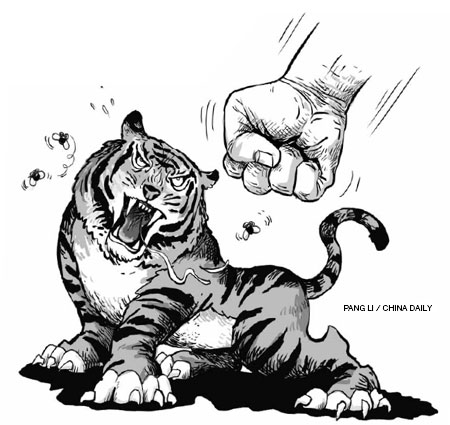

How to maintain a clean government? This is expected to be one of the main topics discussed at the upcoming Third Plenary Session of the 18th Communist Party of China Central Committee.
At the plenary session in 2003, regular inspections were listed as one of 10 in-Party supervision measures, this time the session will discuss ways of making the inspection teams, which at the moment are temporary, more effective in the long run.
It is these teams, sent nationwide every year, that have uncovered considerable evidence of corruption, sometimes involving senior officials. A good example is Chen Liangyu, former Party leader of the Shanghai government, who was discovered to have appropriated social security funds since 2002. He was prosecuted and punished in 2008.
The inspection teams continue to do a good job. As part of the anti-corruption drive, the CPC Central Committee dispatched inspection teams to look for evidence of corruption and misconduct among Party members and officials at the provincial and municipal levels, and a second batch of inspectors, divided into 10 groups, have started inspections of designated government organs and State-owned enterprises.
However, the very fact that the inspection teams have uncovered serious cases of corruption implies loopholes in the anti-corruption system. Some of the cases discovered by the inspection teams have proved to be quite obvious, begging the question why the local anti-corruption commissions failed to spot them.
The answer is also obvious. Due to its deeply rooted traditional culture, China relies heavily on personal relations in society. The local anti-corruption staff, like other members of society, have all kinds of personal relations, some of which are no doubt important to them in their daily lives and work.
Therefore, they have many considerations while performing their duties. A common example is, as soon as they decide to investigate a suspected official, the anti-corruption officers will find their offices filled with people offering excuses for the offending official's behavior. Often some of these defenders will be so powerful that the anti-corruption officers cannot afford to offend them.
Bearing this in mind, it is clear that relying on local anti-corruption staff is far from enough, as it is hardly possible for them to investigate their colleagues, never mind their superiors. Worse, those tasked with finding corruption can themselves be bought. It is not uncommon for anti-corruption staff to be involved in the corruption cases of influential local leaders.
The central inspection teams are totally independent of the local societies and their members are carefully selected to make sure they have no personal relations with the officials being inspected. They are also well-supported by the Central Committee of the Party, which has granted them ample power to supervise suspected officials without intervention from their colleagues or superiors. These inspection teams can hold interviews with officials, accept complaints from ordinary citizens and officials alike, and copy any materials that they consider important. Thus they have sufficient power and autonomy to ensure they can crisply and neatly deal with situations that often appear messy or obscure to their local colleagues.
However, the central inspection teams do not mean the local anti-corruption system is no longer important - the two are complementary, rather than mutually exclusive. Actually, the central inspection teams often do their work through interviews, in which help from local anti-corruption staff is central to the investigation.
Like all mechanisms of its kind, the inspection team system is far from perfect. However, it is an open system and the Central Commission for Discipline Inspection has been amending its regulations to plug any loopholes detected. For example, the inspection teams have adopted a new practice of publicizing a permanent mailing address, so that even when inspections end the people still have a way to complain against corruption.
According to the latest information, the Third Plenary Session is expected to amend the inspection regulations again, possibly placing more emphasis on investigating the leaders of State-owned Enterprises and improving the selection process for members of the inspection team. These are welcome moves; but more needs to be done to build a long-term anti-corruption system. The most urgent task is drawing an anti-corruption law to regulate all the measures against corruption; on that basis we could consider other systems like stricter supervision of public spending, challenge systems and disclosure of officials' assets. There are high hopes that the plenary session will mark a start toward a comprehensive anti-corruption system.
The author is a professor of human studies at the Central Party School. This is an excerpt of her interview with China Daily's Zhang Zhouxiang.

(China Daily 11/06/2013 page9)